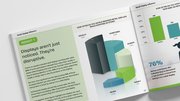Article
Five ways to win back new private-label shoppers
American consumers continue to switch to lower-cost, private-label goods across every supermarket category.

February 10, 2011
It is hard to put a label on consumer purchase behavior these days, what with Americans pulling out of the recession. But one thing is clear: The store brand is gaining ground as a core brand in an increasing number of households.
Despite improving employment figures and a stabilizing economy, American consumers continue to switch to lower-cost, private-label goods across every supermarket category. From cheese to shampoo to laundry detergent, shoppers are trading to store brands in the double digits — roughly 74 percent of almost 1,500 consumers recently surveyed by Epsilon Targeting said they shifted to private label in both food and household products. A surprising 61 percent switched in personal care.
This move could indicate not only the fading perception that purchasing store brands means sacrificing quality, but also that consumers are becoming satisfied with the value of these alternatives. (Wow, the store brand painkiller worked!) Yet at the same time, our research shows national brands still wield influence: In almost all segments, more than 65 percent of consumers said would return to their national brands, with a coupon.
For manufacturers of the nation’s most enduring brands, this is sobering shift, but they can rise to the challenge. The formula for winning back the best customers is well within reach — packaged goods makers just require the key ingredients of scale, consumer data and new-and-improved communication channels.
To recapture this shifting segment and, importantly, to prevent additional brand-switches, we offer these state-of-the-industry findings:
- Target the Former Faithful: While more than 65 percent of those surveyed said they would return to their national brand if given the right offer, that means roughly 35 percent are not likely to switch. Marketers should first identify those consumers who would return to their national brand and then target them with coupons, samples and similar incentives. It is important to avoid directing resources to those consumers who are not willing to trade back, but focus instead on those who will deliver a meaningful return.
- Reward the Savvy Shopper: These days there is less of a stigma associated with store brands, coupons and other efforts to save money — this includes "image" categories such as hair and facial care. In addition to using coupons and samples, manufacturers can increase their consumer connections with "Savvy Shopper" clubs and similar loyalty programs tailored to the shopper’s lifestyle. Such rewards will increase the shopper’s emotional investment in the brand, and potentially result in powerful word-of-mouth marketing.
- Track the High-Risk Categories:Our research shows more consumers are switching to private label in high-quality categories such laundry detergent and diapers. Consumers make these decisions based on two factors: price and quality. Manufacturers must use their data to identify these price-conscious consumers and then target them with tailored promotions that emphasize the quality and value of the product. This equation should attract the shopper not just once, but for the long term.
- Use Food for Thought:The Wall Street Journal recently reported that food prices will continue to rise, meaning that the trend toward store-brand foods will likely escalate. Using this pricing knowledge, manufacturers can cross-reference those categories with vulnerable pricing against the spending patterns of their best shoppers, and then promote accordingly. This trend also presents an opportunity for non-food marketers to develop cross-category promotions — "buy two cans of soup, get $1 off cold remedy."
- Channel Surf for Success: Access to robust, actionable consumer data and shopper insight enables national brands to identify what their best shoppers buy, where they buy it and when. Then, they can use this intelligence to reach these shoppers where they are – applying the "what, where, when" knowledge across all channels, from direct mail to mobile phone. National brands have the advantage of scale and can create a deeper emotional link with consumers through the web, social media and other channels where private labels might not venture.
No generic answers
Indeed, there is no prepackaged solution to winning back consumers who have switched to store brands. But manufacturers certainly do have a recipe for altering the shift — it exists through the use of shopper data and tailored marketing.
The first step is segmenting out those consumers who have traditionally been faithful to national brands, since private-label loyalists are much more difficult to win back. Then, using robust, actionable data, manufacturers can win best shoppers with samples and money-saving promotions that emphasize the better quality of their product and innovative features. (New and improved! Works longer while reducing drowsiness.)
Lastly — and importantly — manufacturers must deploy their data based not only on what shoppers buy, but where they are likely to be reached, from the mailbox to the smart phone.
By combining these top-shelf ingredients, manufacturers should be able to recapture their most desired consumers while preventing others from switching to store brands. Most importantly, they’ll understand their shoppers better in the long run, which is the trademark of advanced, cross-channel marketing.
Warren Storey is vice president of Epsilon Targeting. (Photo by Rob Stinnett.)
 ChatGPT
ChatGPT Grok
Grok Perplexity
Perplexity Claude
Claude




